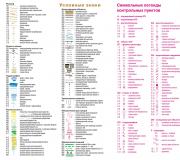The abbreviation for. Thematic vocabulary
- Everything is fine, thank you!
- Please.
Example: MYOB = mind your own business (mind your own business)
Below you will find a whole list of English abbreviations (in SMS, social networks, forums). Study it thoroughly to understand what English-speaking interlocutors want from you.
As a preface: colloquial abbreviations in English
Of course, it is advisable to use abbreviations of English words only in informal correspondence (personal messages, chats). At the same time, there is a known case when a 13-year-old girl wrote a school essay, almost entirely based on English abbreviations. Here is an excerpt from it, try to read and understand the meaning of what is written:
My smmr hols wr CWOT. B4, we used 2go2 NY 2C my bro, his GF & thr 3:- kids FTF. ILNY, it's a gr8 plc.
Happened? Now read the “translation”:
My summer hols (abbreviated as holidays) were a complete waste of time. Before, we used to go to NY (New York) to see my brother, his girlfriend and their 3 kids face to face. I love New York, it’s a great place.
As you can see, English abbreviations in the letter are built:
- on the use of numbers (4, 8)
- on letter names (R = are, C = see)
- on vowel ejection (smmr = summer)
- on acronyms - a type of abbreviation formed by initial letters (ILNY = I love New York).
So, let's move on to our dictionary of English abbreviations.
His Majesty Slang: deciphering English abbreviations
The article will indicate the translation of abbreviations from English into Russian. But where additional clarification is required, we will provide that too. Enjoy!
0 = nothing
2 = two, to, too (two, preposition to, too)
2DAY = today (today)
2MORO / 2MROW = tomorrow (tomorrow)
2NITE / 2NYT = tonight (tonight, tonight)
2U = to you (to you)
4U = for you (for you)
4E = forever
AFAIK= as far as I know (as far as I know)
ASAP = as soon as possible (at the first opportunity, as soon as possible)
ATB = all the best (all the best)
B = to be
B4 = before (before)
B4N = bye for now (bye, see you)
BAU = business as usual (idiom meaning that things continue as usual despite the difficult situation)
BBL = to be back later (come back later, be later)
BC = because (because)
BF = boyfriend (young man, guy, boyfriend)
BK = back (back, back)
BRB = to be right back (back soon). For example, you are “chatting” with someone, but forced to leave for a while. BRB (back soon), - you write, and go about your business.
BRO = brother
BTW = by the way (by the way, by the way)
BYOB / BYO = to bring your own booze, to bring your own bottle (“with your own alcohol”). Indicated on the invitation when the party host will not provide drinks for guests. By the way, the band System Of A Down has a song B.Y.O.B. (Bring Your Own Bombs instead of Bottle).
C = to see
CIAO = goodbye (goodbye, bye). This abbreviation for correspondence in English is derived from Italian Ciao(and it is pronounced exactly like this - ciao).
COS / CUZ = because (because)
CUL8R = call you later / see you later (I'll call you later / see you later)
CUL = see you later (see you later)
CWOT = complete waste of time
D8 = date (date, date)
DNR = dinner
EOD = end of debate. Used during an argument when you want to stop it: That's it, EOD! (That's it, let's stop arguing!)
EZ = easy (easy, simple, convenient)
F2F / FTF = face to face (face to face)
F8 = fate
FYI = for your information
GF = girlfriend (girlfriend)
GMTA = great minds think alike (the saying “Great minds think alike”). Something like ours “fools think alike” just the other way around :)
GR8 = great (wonderful, excellent, etc.)
GTG = got to go (got to go)
HAND = have a nice day (have a nice day)
HB2U = happy birthday to you (happy birthday)
HOLS = holidays (vacation, vacation)
HRU = how are you (how are you? How are you?)
HV = to have
ICBW = it could be worse (could be worse)
IDK = I dont know (I don’t know)
IDTS = I don’t think so (I don’t think so, I don’t think so, I don’t agree)
ILU / Luv U = I love you (I love you)
IMHO = in my humble opinion (in my humble opinion). Expression has long migrated to our Internet in the form of transliteration IMHO.
IYKWIM = if you know what I mean (if you know what I mean)
JK = just kidding (just kidding, it's a joke)
KDS = kids
KIT = to keep in touch (stay in touch)
KOTC = kiss on the cheek (kiss on the cheek)
L8 = late (late, recently, recently)
L8R = later
LMAO = laughing my ass out (so funny that I laughed off my ass).
LOL = laughing out loud (the meaning is identical to the previous one). This popular English abbreviation is also borrowed from our Internet slang in the form of transliteration LOL.
LSKOL = long slow kiss on the lips (French kiss)
LTNS = long time no see (long time no see)

Example from stickers for Viber
Luv U2 = I love you too (I love you too)
M8 = mate (buddy, friend, dude). Slang word mate- about the same as dude (dude, boy, etc.): Hey, mate, what’s up? (Hey man, how's it going?)
MON = the middle of nowhere (idiom meaning “very far away, in the middle of nowhere”)
MSG = message (message, message)
MTE = my thoughts exactly (you read my thoughts, I think exactly the same)
MU = I miss you (I miss you)
MUSM = I miss you so much (I miss you very much)
MYOB = mind your own business (mind your own business, don’t meddle in other people’s business)
N2S = needless to say (it goes without saying, it’s obvious that...)
NE1 = anyone (anyone, anyone)
NO1 = no one (no one)
NP = no problem (no problem, no problem)
OIC = oh, I see (I see; that's it). Used in a situation when you want to show your interlocutor that you understand the subject of the conversation.

PC&QT – peace and quiet (peace and quiet). An idiom most often used in the context of wanting a quieter life is: All I want is a little peace and quiet (All I want is a little peace and quiet).
PCM = please call me (please call me)
PLS = please (please)
PS = parents
QT = cutie
R = are (form of verbs to be)
ROFL / ROTFL = rolling of the floor laughing (rolling on the floor laughing)
RUOK = are you ok? (Are you okay? Is everything okay?)
SIS = sister
SKOOL = school (school)
SMMR = summer
SOB = stressed out bad (feel very stressed)
This video has subtitles.
SOM1 = someone
TGIF = thank God it’s Friday (Thank God, today is Friday)
THX = thanks
THNQ = thank you (thank you)
TTYL = talk to you later (let's talk later)
WAN2 = to want to (want)
WKND = weekend
WR = were (form of the verb to be)
WUCIWUG = what you see is what you get (what you see is what you get)

The phrase was used for creative posters for Heinz ketchup
The expression has several meanings:
- A property of application programs or web interfaces in which content is displayed during editing and appears as closely as possible to the final product (more details).
- A definition that is used when the speaker wants to show that there is nothing hidden, there are no secrets or pitfalls.
Can be used as a definition an honest and open person:
He is a what-you-see-is-what-you-get kind of person. (He is a “what you see is what you get” type of person)
The idiom can also be used, for example, by salespeople in a store when they assure us that the product we are buying is looks the same as on the display:
The product you are looking at is exactly what you get if you buy it. What you see is what you get. The ones in the box are just like this one. (If you buy this product, you will receive exactly what you see now. The items in the boxes are exactly the same as this one).
X = kiss
XLNT = excellent (excellent, excellent)
XOXO = hugs and kisses (hugs and kisses). More precisely, “hugs and kisses”, if you follow Internet trends :)

YR = your / you’re (your / you + form of the verb to be)
ZZZ.. = to sleep (sleep) The abbreviation is used when a person wants to show the interlocutor that he is already asleep / falling asleep.
Finally: how to understand modern abbreviations in English
As you can see, all English abbreviations on the Internet follow a certain logic, the principles of which we discussed at the beginning of the article. Therefore, it is enough to “scan through them with your eyes” several times, and you will easily be able to use and, most importantly, understand them. CUL8R, M8 :)
I.e. And e.g.- Latin abbreviations. I.e. replaces idest and means “that is” - “that is”. E.g. replaces exemplary gratia. This combination means "for example" - for example.
How to remember the difference between I.e. And E.g.?
We, of course, do not force you to learn Latin. English is enough for you! If in practice you often have to deal with written texts - you create them or read them - then these two abbreviations are probably what is called “puzzle you from time to time”. How to remember what they mean?
To begin with, we suggest that you completely forget their translation and Latin equivalents. Let's try this: in i.e. there is i, which means "in other words". In e.g. there is e - "example".
Where and how to use i.e. and e.g.?
E.g. stands for "for example". Therefore, we insert this abbreviation to provide some examples:
Buy some vegetables, e.g., carrots.
I.e. means "that is". This expression is needed to introduce an explanation or detail into a sentence:
The three U.S. states on the west coast (i.e., Washington, Oregon and California) have favorable climates.
If you are still not sure whether you can use these abbreviations, do not despair: they can always be replaced with “in other words” and “for example”. After all, there is no doctrine or guideline for the mandatory use of Latin notations.
Do's and Don'ts
- In written texts, do not highlight i.e. and e.g. in italics. Although these are Latin expressions, they have long been an integral part of the English language and are quite familiar to native speakers. Therefore, there is no need to distinguish them somehow.
- It is also recommended to place a comma after i.e. and e.g.. Don't be surprised if your spelling and punctuation check emphasizes that comma. 95% of grammar reference books recommend this punctuation mark. But remember: the comma is “promoted” by speakers of American English, while the British advocate for its omission.
- Try not to use i.e. and e.g. in oral speech. Latin abbreviations are still the property of the written language. In conversation, “in other words” and “for example” are just right.
- Many people insert examples etc at the end of the list. This is completely unnecessary, because the use of e.g. already suggests an incomplete list.
“I.e.” and “e.g.”- two abbreviations that many people confuse in written communications in English, as well as when translating. Therefore, it is worth understanding their origin, meaning and use, and, of course, correct punctuation
And we'll start with the meaning.

I.e.. means “essentially”, “essentially”, “essentially”, “in general”, “that is”, “in other words”. The abbreviation comes from the Latin “id est” (“that is” in English).
E.g. means “for example” and comes from the Latin “exempli gratia” (“for example” in English).
How can you remember them and not make mistakes when writing text in English? Native English speakers have some good advice. Abbreviation i.e. starts with a letter "I", and means the expression “ I n E ssence" or " I n other words.” And although both expressions are not an exact translation from Latin, they nevertheless convey the general meaning, which allows us to make a choice in favor “i.e.”. To remember when to write “e.g.”, we can again resort to the associative example - “ E sample G even.” You can also make an association with the word itself “ E xample”, which begins with the letter "e".
Let's look at how both abbreviations are used in writing.
We remember that “i.e.” means “in essence” or “in other words”, so we use this abbreviation to clarify or specify the content of what was said earlier. For example,
The coat is made up of synthetic materials (i.e., not leather or suede). - The coat is made of synthetic materials (that is , not leather or suede). In this proposal, we clarify and specify which materials were not used to sew the coat.
“E.g.” means “for example”, and we use this abbreviation to illustrate the sentence with examples. For example,
I like citrus fruit (e.g. ., oranges, lemons, grapefruits).- I love citrus fruits ( For example, oranges, lemons, grapefruits).
Vegetables (e.g. , broccoli, carrots and radishes) are good for you. - Vegetables (such as broccoli, carrots and radishes) are good for you. Both sentences provide examples that correspond to the indicated thematic groups - “fruits” and “vegetables”.
It is worth saying a few words about the punctuation of abbreviations. First, put point after each letter - “i.e.” and “e.g.” Secondly, abbreviations are usually followed by comma. Sometimes the question arises about the need to use italics. In practice, italics are used extremely rarely, although both expressions came from the Latin language without undergoing any changes. A number of style features should also be observed. In official style texts, abbreviations should be taken in brackets. For example,
I also enjoy citrus soda (e.g., Mountain Dew, Mello Yellow).- I also like citrus soft drinks (eg Mountain Dew, Yellow Mellow). All previous examples were designed in exactly the same way. For informal messages, there are several ways to format abbreviations. The abbreviation is preceded by comma, or dash. For example,
I also enjoy citrus soda, e.g., Mountain Dew, Mello Yellow.
I also enjoy citrus soda- e.g., Mountain Dew, Mello Yellow.
It happened in August, i.e., two months ago.
Having familiarized yourself with the advice of native speakers, you are unlikely to have doubts in the future when choosing abbreviations “i.e.” And “e.g.” And perhaps share your experience with friends or colleagues.
Monzheley Elena Petrovna,
English teacher
Good afternoon, dear readers of the blog that talks about... Today I decided to touch upon such interesting and quite common abbreviations in the English written language as i.e. and e.g. I'll tell you about meaning each of these abbreviations, and will also show by example when to use “i.e.” and when to use “e.g.”.
Latin abbreviations "i.e." and "e.g." can be found quite often in English literature, and indeed in everyday written language. To go further, these abbreviations would be used even more often if people were more confident in understanding when to use “i.e.” and when to use “e.g.” Therefore, to begin with, I propose to understand what these simple abbreviations mean.
I.E. - Meaning? I.E. -What does Abbreviation mean?
Abbreviation i.e. usually inserted into a sentence as a substitute for “that is.” The abbreviation came to English from the Latin language and in its unabridged version was written as “id est”. I.e. It is appropriate to use the phrases “in other words” or “that is” as a substitute (as mentioned above). This abbreviation is used when something needs to be emphasized more clearly or clarified.
E.G. - Meaning? E.G. -What does Abbreviation mean?
“E.g.” means "for example". Like the first abbreviation, the abbreviation e.g. comes from the Latin expression “exempli gratia” (“for the sake of example”). “E.g.” appropriate to use when you do not intend to list everything that is currently being discussed.
Examples of using “i.e.” and “e.g.” :
Example 1: Places
I.E. (Id Est)
Example sentence
I am going to the place where I relax best, i.e., the coffee shop.
Explanation
[There is only one place that, in my opinion, is the best place to relax. Using “i.e.” I show everyone that I especially love to relax in this place.]
E.G. (Exempli Gratia)
Example sentence
At the places where I relax well, e.g., Tchibo, I have none of the distractions I have at home.
Explanation
[There are a large number of coffee shops that I like, for example, one of them is the Tchibo coffee chain]
The abbreviation “e.g.” can be used with several examples at once, but do not end all your examples with “etc”. No need to write: I like coffee shops, e.g., Tchibo, Starbucks, etc. Instead, it is better to write like this: There is debate as to whether some of the Ottonian emperors (e.g., Saint Henry II and Otto I the Great) were evil.
Example 2. Helen of Troy and her brothers and sisters
I.E. (Id Est)
The most beautiful human in Greek mythology, i.e., Leda’s daughter Helen, may have had a unibrow, according to a 2012 book on Helen I’m reading.
[Helen, whose beauty caused the outbreak of the Trojan War, is considered the most beautiful woman according to Greek mythology. She does not and cannot have any rivals.]
E.G. (Exempli Gratia)
The children of Leda, e.g., Castor and Pollux, were born in pairs.
[It is believed that a pair of boys, with the names Castor and Pollux, could be twins, but as for all the other children of Helen of Troy, historians are not so sure. According to Greek mythology, Helen was hatched from an egg, but despite this unusual birth, she was able to give birth to a number of twins, and Castor and Pollux are one example.]
Italics I.E. and E.G.
Abbreviations i.e. and e.g. - these are such common Latin abbreviations that it is absolutely not necessary to put them in italics.




